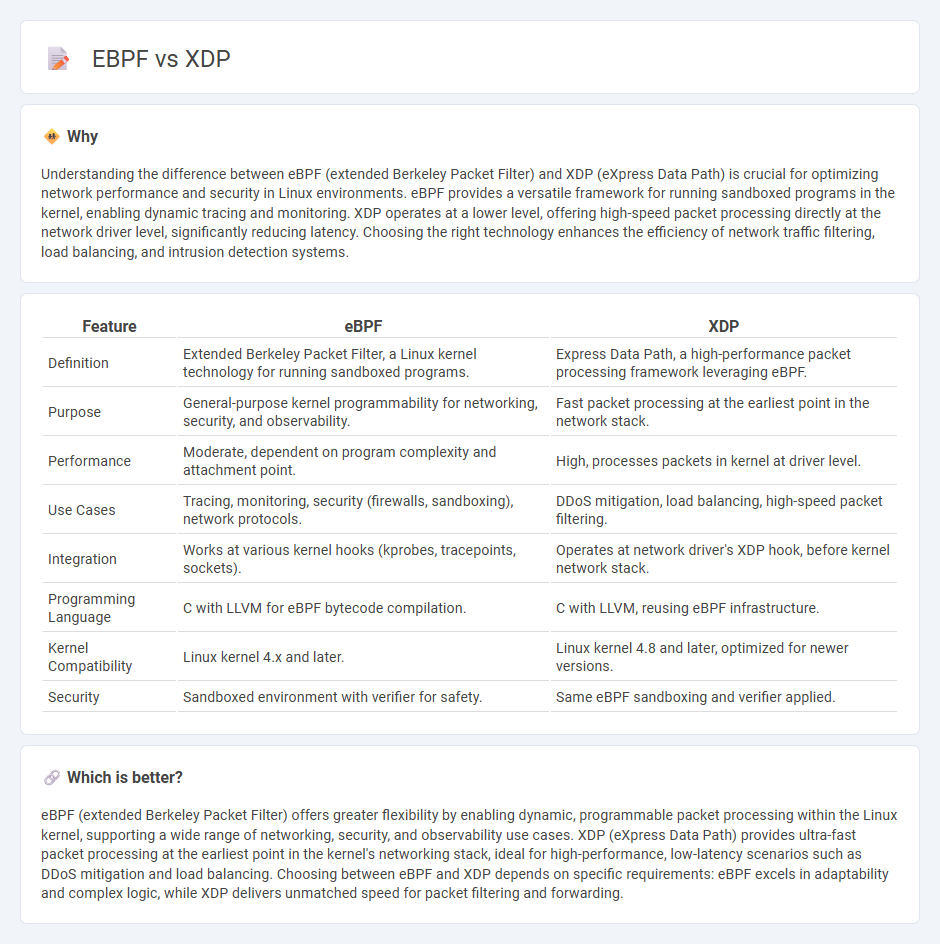
eBPF (extended Berkeley Packet Filter) enables efficient packet processing by allowing custom code execution within the Linux kernel, enhancing network visibility and performance. XDP (Express Data Path) leverages eBPF for ultra-fast packet processing directly at the driver level, reducing latency and CPU overhead in high-speed networking environments. Explore how eBPF and XDP innovations transform modern network operations and application performance.
Why it is important
Understanding the difference between eBPF (extended Berkeley Packet Filter) and XDP (eXpress Data Path) is crucial for optimizing network performance and security in Linux environments. eBPF provides a versatile framework for running sandboxed programs in the kernel, enabling dynamic tracing and monitoring. XDP operates at a lower level, offering high-speed packet processing directly at the network driver level, significantly reducing latency. Choosing the right technology enhances the efficiency of network traffic filtering, load balancing, and intrusion detection systems.
Comparison Table
| Feature | eBPF | XDP |
|---|---|---|
| Definition | Extended Berkeley Packet Filter, a Linux kernel technology for running sandboxed programs. | Express Data Path, a high-performance packet processing framework leveraging eBPF. |
| Purpose | General-purpose kernel programmability for networking, security, and observability. | Fast packet processing at the earliest point in the network stack. |
| Performance | Moderate, dependent on program complexity and attachment point. | High, processes packets in kernel at driver level. |
| Use Cases | Tracing, monitoring, security (firewalls, sandboxing), network protocols. | DDoS mitigation, load balancing, high-speed packet filtering. |
| Integration | Works at various kernel hooks (kprobes, tracepoints, sockets). | Operates at network driver's XDP hook, before kernel network stack. |
| Programming Language | C with LLVM for eBPF bytecode compilation. | C with LLVM, reusing eBPF infrastructure. |
| Kernel Compatibility | Linux kernel 4.x and later. | Linux kernel 4.8 and later, optimized for newer versions. |
| Security | Sandboxed environment with verifier for safety. | Same eBPF sandboxing and verifier applied. |
Which is better?
eBPF (extended Berkeley Packet Filter) offers greater flexibility by enabling dynamic, programmable packet processing within the Linux kernel, supporting a wide range of networking, security, and observability use cases. XDP (eXpress Data Path) provides ultra-fast packet processing at the earliest point in the kernel's networking stack, ideal for high-performance, low-latency scenarios such as DDoS mitigation and load balancing. Choosing between eBPF and XDP depends on specific requirements: eBPF excels in adaptability and complex logic, while XDP delivers unmatched speed for packet filtering and forwarding.
Connection
eBPF (extended Berkeley Packet Filter) enables programmable packet processing within the Linux kernel, allowing custom code to run safely at high speeds. XDP (eXpress Data Path) leverages eBPF to perform ultra-low-latency network packet filtering and processing directly at the driver level, before the kernel networking stack. Together, eBPF and XDP enhance network performance and security by enabling efficient, programmable packet handling tailored to specific workloads.
Key Terms
Packet Processing
XDP (eXpress Data Path) leverages eBPF (extended Berkeley Packet Filter) to enable high-performance, programmable packet processing directly within the Linux kernel, reducing latency by handling packets at the earliest possible point. eBPF provides a versatile framework for running sandboxed programs in the kernel, allowing dynamic packet filtering, traffic control, and monitoring without kernel recompilation or module loading. Explore how XDP and eBPF revolutionize network security and performance by diving deeper into their architecture and use cases.
Kernel Bypass
XDP (eXpress Data Path) enables high-performance packet processing by executing code at the earliest point in the Linux kernel networking stack, effectively bypassing traditional kernel layers. eBPF (extended Berkeley Packet Filter) extends this capability with more flexible, programmable hooks across various kernel subsystems, allowing dynamic kernel bypass and custom logic execution. Explore the nuances of XDP and eBPF kernel bypass to optimize network performance and security in modern infrastructures.
Programmability
XDP (eXpress Data Path) offers high-performance packet processing by leveraging eBPF (extended Berkeley Packet Filter) for programmable, kernel-level network functions. eBPF extends XDP capabilities with flexible programmability, enabling custom code execution within the kernel for enhanced security, monitoring, and networking features. Explore how XDP and eBPF empower developers to optimize networking workflows with unparalleled efficiency and control.
Source and External Links
XDP - IO Visor Project - XDP (eXpress Data Path) is a high-performance programmable network data path in the Linux kernel that enables fast packet processing at the lowest software stack level without specialized hardware or kernel bypass, using BPF for extensibility and working alongside the TCP/IP stack.
XDP Xtreme Diesel Performance - XDP is a manufacturer and retailer specializing in high-quality diesel performance parts and accessories for engines like Cummins, Duramax, and Powerstroke, offering products aimed to enhance power, reliability, and efficiency for trucks.
XDP | Xtreme Diesel Performance | We Know What Powers You - XDP provides a comprehensive range of direct OE replacement and aftermarket diesel performance parts including fuel injectors, starters, radiators, and turbochargers, serving the diesel truck community with quality parts and free shipping over $99.
 dowidth.com
dowidth.com